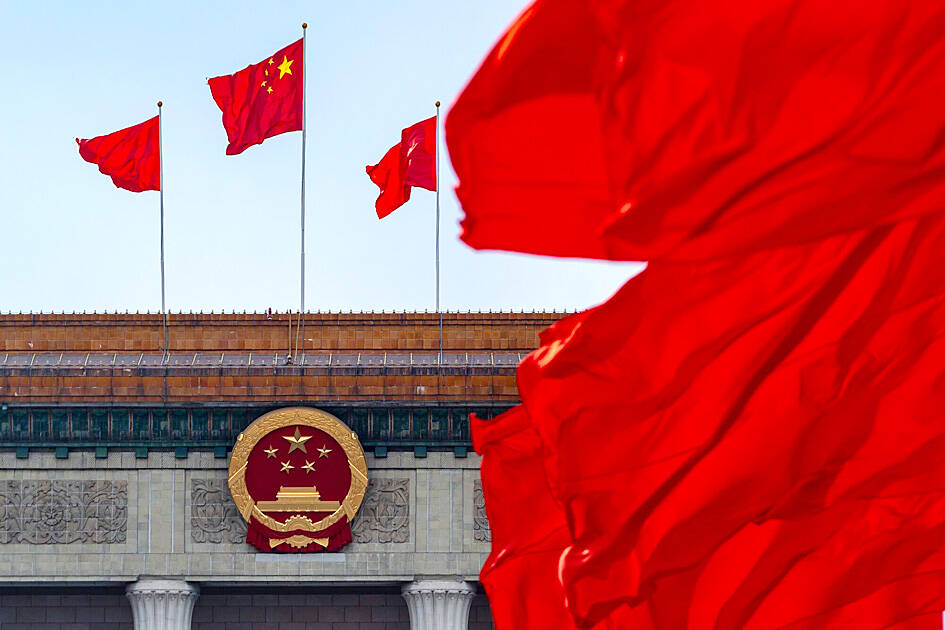China’s Patriotic Education Law, implemented last year, included patriotism and party loyalty in China’s legal framework, requiring unconditional loyalty rather than earning public trust, a Taiwanese academic said.
Since the law’s implementation more than a year ago, China’s local governments have promoted events and education centered around party loyalty, patriotism and socialism, National Cheng Kung University political science professor Hung Chin-fu (洪敬富) wrote in an article published in the Mainland Affairs Council’s latest briefing.
Beijing has also amplified narratives about anti-China forces interfering in domestic affairs, particularly regarding Taiwan, democracy, human rights and governance systems, he said.

Photo: Bloomberg
China uses patriotism as a tool to rationalize nationalism, he said, adding that the Chinese Communist Party justifies its actions by calling them “patriotic,” and combines nationalism with national interests.
Actions by nationalists online, including xenophobic statements, boycotting foreign products and promoting national brands, are glorified as expressions of patriotism and party loyalty by the public and government officials, Hung said.
The prevalence of xenophobia in Chinese society has manifested in attacks on foreigners, Hung added.
For example, four American teachers on June 11 last year were attacked in Jilin Province by a man with anti-US sentiments. On Sept. 28 last year, a 10-year-old Japanese boy was attacked on his way to the Shenzhen Japanese school and died from the injuries at a hospital. Then there was the Chinese man who on Oct. 1 spoke of party loyalty and patriotism before attacking three five-year-old children in Zurich, Switzerland.
Those tragic events show how China’s narrow nationalist ideology and patriotic education has fueled violent xenophobic sentiments, Hung said.
The Patriotic Education Law integrates party loyalty, patriotism and socialism into China’s legal framework, rather than being limited to propaganda, he said.
That “trinity” put forth by Chinese President Xi Jinping (習近平) is captured by the slogan “listen to the party, thank the party and follow the party (聽黨話,感黨恩,跟黨走),” he added.
China is so focused on cultivating patriotism that it largely neglects public welfare, such as providing necessary services, including medicine, employment, education and housing, Hung said.
The Chinese government should focus on people’s needs and earn the public’s trust through concrete action, rather than requiring them to be unconditionally loyal and patriotic, he said.

Taiwan is stepping up plans to create self-sufficient supply chains for combat drones and increase foreign orders from the US to counter China’s numerical superiority, a defense official said on Saturday. Commenting on condition of anonymity, the official said the nation’s armed forces are in agreement with US Admiral Samuel Paparo’s assessment that Taiwan’s military must be prepared to turn the nation’s waters into a “hellscape” for the Chinese People’s Liberation Army (PLA). Paparo, the commander of the US Indo-Pacific Command, reiterated the concept during a Congressional hearing in Washington on Wednesday. He first coined the term in a security conference last

Prosecutors today declined to say who was questioned regarding alleged forgery on petitions to recall Democratic Progressive Party (DPP) legislators, after Chinese-language media earlier reported that members of the Chinese Nationalist Party (KMT) Youth League were brought in for questioning. The Ministry of Justice Investigation Bureau confirmed that two people had been questioned, but did not disclose any further information about the ongoing investigation. KMT Youth League members Lee Hsiao-liang (李孝亮) and Liu Szu-yin (劉思吟) — who are leading the effort to recall DPP caucus chief executive Rosalia Wu (吳思瑤) and Legislator Wu Pei-yi (吳沛憶) — both posted on Facebook saying: “I

The Ministry of Economic Affairs has fined Taobao NT$1.2 million (US$36,912) for advertisements that exceed its approved business scope, requiring the Chinese e-commerce platform to make corrections in the first half of this year or its license may be revoked. Lawmakers have called for stricter enforcement of Chinese e-commerce platforms and measures to prevent China from laundering its goods through Taiwan in response to US President Donald Trump’s heavy tariffs on China. The Legislative Yuan’s Finance Committee met today to discuss policies to prevent China from dumping goods in Taiwan, inviting government agencies to report. Democratic Progressive Party Legislator Kuo Kuo-wen (郭國文) said

The Ministry of Economic Affairs has fined Taobao NT$1.2 million (US$36,900) for advertisements that exceeded its approved business scope and ordered the Chinese e-commerce platform to make corrections in the first half of this year or its license would be revoked. Lawmakers have called for stricter supervision of Chinese e-commerce platforms and more stringent measures to prevent China from laundering its goods through Taiwan as US President Donald Trump’s administration cracks down on origin laundering. The legislature’s Finance Committee yesterday met to discuss policies to prevent China from dumping goods in Taiwan, inviting government agencies to report on the matter. Democratic Progressive Party